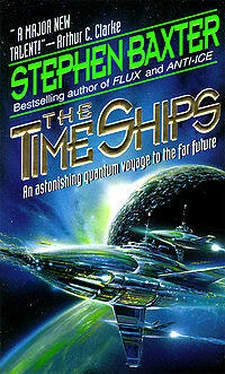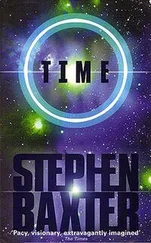“It’s a remarkable account.”
“It’s more than that,” I said, my voice hoarse. “Don’t you see? On my second journey into the future, I traveled into a different History. The Time Machine is a Wrecker of History — a Destroyer of Worlds and Species. Don’t you see why it must not be built?”
Moses turned to Nebogipfel, “If you are a Man from the Future — what do you have to say to all this?”
Nebogipfel’s chair was still in shadow, but he cowered from the encroaching daylight. “I am not a Man,” he said in his cold, quiet voice. “But I am from a Future — one of an infinite number, perhaps, of possible variants. And it seems true — it is certainly logically possible — that a Time Machine can change History’s course, thus generating new variants of events. In fact the very principle of the Machine’s operation appears to rely on its extension, through the properties of Plattnerite, into another, parallel History.”
Moses went to the window, and the rising sun caught his profile. “But to abandon my research, just on your uncorroborated say-so.
“Say-so? I think I deserve a little more respect than that,” I said, in rising anger. “After all, I am you! Oh, you are so stubborn. I’ve brought a Man from the Future — what more persuasion do you want?”
He shook his head. “Look,” he said, “I’m tired — I’ve been up all night, and all that brandy hasn’t helped much. And you two look as if you could do with some rest as well. I have spare rooms; I’ll escort you—”
“I know the way,” I said with some frost.
He conceded the point with some humor. “I’ll have Mrs. Penforth bring you breakfast… or,” he went on, looking at Nebogipfel again, “perhaps I’ll have it served in here.
“Come,” he said. “The Destiny of the Race can wait for a few hours.”
I slept deeply — remarkably so. I was wakened by Moses, who brought me a pitcher of hot water.
I’d folded up my clothes on a chair; after my adventures in time, they were rather the worse for wear. “I don’t suppose you could lend me a suit of clothes, could you?”
“You can have a house-coat, if you like. I’m sorry, old man — I hardly think anything of mine would fit you!”
I was angered by this casual arrogance. “One day, you too will grow a little older. And then I hope you remember — Oh — never mind!” I said.
“Look — I’ll have my man brush out these clothes for you, and patch the worst damage. Come down when you’re ready.”
In the dining-room, breakfast had been set out as a sort of buffet. Moses and Nebogipfel were already there. Moses wore the same costume as yesterday — or at least, an identical copy of it. The bright morning sun turned the parakeet colors of his coat into a clamor even more ghastly than before. And as for Nebogipfel, the Morlock was now dressed — ludicrously! — in short trousers and battered blazer. He had a cap tucked over his goggled, hairy face, and he stood patiently by the buffet.
“I told Mrs. Penforth to keep out of here,” Moses said. “As for Nebogipfel, that battered jacket of yours — it’s over the back of that chair, by the way — seemed hardly sufficient for him. So I dug out an old school uniform — the only thing I could find that might fit him: he reeks of moth-balls, but he seems a little happier.
“Now then.” He walked up to Nebogipfel. “Let me help you, sir. What would you like? You can see we have bacon, eggs, toast, sausages—”
In his quiet, fluid tones, Nebogipfel asked Moses to explain the provenance of these various items. Moses did so, in graphic terms: he picked up a slice of bacon on his fork, for example, and described the Nature of the Pig.
When Moses was done, Nebogipfel picked up a single piece of fruit — an apple — and walked with that, and a glass of water, to the room’s darkest corner.
As for me, after subsisting for so long on a diet of the Morlocks’ bland stuff, I could not have relished my breakfast more if I had known — which I did not — that it was the last nineteenth-century meal I should ever enjoy!
With breakfast done, Moses escorted us to his smoking-room. Nebogipfel installed himself in the darkest corner, while Moses and I sat on opposed armchairs. Moses dug out his pipe, filled it from a small pouch in his pocket, and lit it.
I watched him, seething. He was so maddeningly calm! “Do you have nothing to say? I have brought you a dire warning from the future — from several futures — which—”
“Yes,” he said, “it is dramatic stuff. But,” he went on, tamping down his pipe, “I’m still not sure if—”
“Not sure?” I cried, jumping to my feet. “What more proof — what persuasion — do you want?”
“It seems to me that your logic has a few holes. Oh, do sit down.”
I sat, feeling weak. “Holes?”
“Look at it this way. You claim that I’m you — and you’re me. Yes?”
“Exactly. We are two slices of a single Four-Dimensioned entity, taken at different points, and juxtaposed by the Time Machine.”
“Very well. But let us consider this: if you were once me, then you should share my memories.”
“I—” I fell silent.
“Then,” Moses said with a note of triumph, “what memories do you have of a rather burly stranger, and an odd companion of this sort, turning up on the door-step one night? Eh?”
The answer, of course — horrifying! impossible! — was that I had no such memories. I turned to Nebogipfel, stricken. “How can this not have occurred to me? Of course, my mission is impossible. It always was. I could never persuade young Moses, because I have no memories of how I, when I was Moses, was persuaded in my turn!”
The Morlock retorted, “Cause and Effect, when Time Machines are about, are rather awkward concepts.”
Moses said, with more of that insufferable cockiness, “Here’s another puzzle for you. Suppose I agree with you. Suppose I accept your story about your trips into time and your visions of Histories and so forth. Suppose I agree to destroy the Time Machine.”
I could anticipate his argument. “Then, if the Time Machine were never built—”
“You would not be able to return through time, to put a stop to its building”
“ — and so the machine would be built after all…”
“ — and you would return through time to stop the building once more — and on it would go, like an endless merry-go-round!” he cried with a flourish.
“Yes. It is a pathological causal loop,” Nebogipfel said. “The Time Machine must be built, in order to put a stop to its own building…”
I buried my face in my hands. Apart from my despair at the destruction of my case, I had the uncomfortable feeling that young Moses was more intelligent than I. I should have spotted these logical difficulties! — perhaps it was true, horribly, that intelligence, like more gross physical faculties, declines as age comes on.
“But — despite all this logic-chopping — it is nevertheless the truth,” I whispered. “And the machine must never be built.”
“Then you explain it,” Moses said with less sympathy. “ ’To Be, or Not to Be’ — that, it seems, is not the question. If you are me, you will remember being forced to play the part of Hamlet’s Father in that dire production at school.”
“I remember it well.”
“The question is more, it seems to me: How can things Be and — simultaneously — Not Be?”
“But it is true,” Nebogipfel said. The Morlock stepped forward a little way, into the light, and looked from one to the other of us. “But we must construct, it seems to me, a higher logic — a logic which can take account of the interaction of a Time Machine with History — a logic capable of dealing with a Multiplicity of Histories…”
Читать дальше
Конец ознакомительного отрывка
Купить книгу









